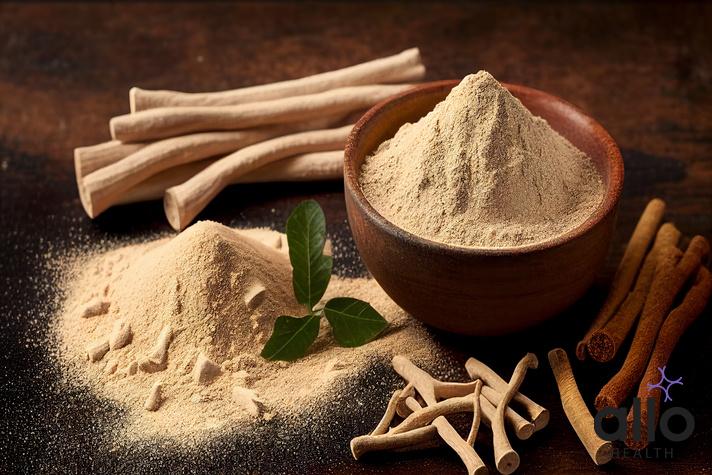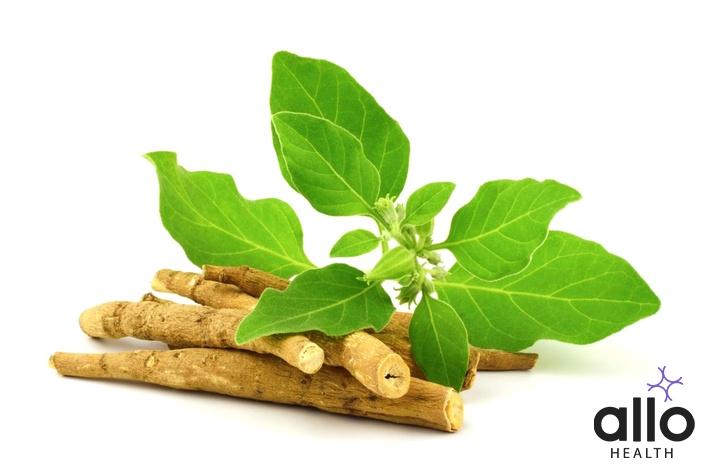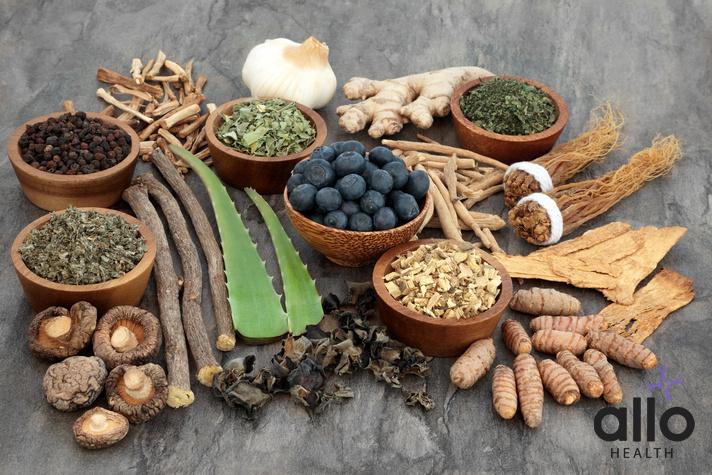Benefits Of Ashwagandha For PCOS Management

Allo Health is dedicated to personalized well-being, offering support and trusted information tailored to individual health goals. The platform emphasizes human-generated content, led by a distinguished medical team of experts, including physicians and sexual health specialists. Their commitment to credibility involves rigorous fact-checking, authoritative research, and continuous updates to ensure accurate, up-to-date information. Allo Health's unique approach goes beyond conventional platforms, providing expert-led insights and a continuous commitment to excellence, with user feedback playing a crucial role in shaping the platform's authoritative voice.

Dr.Sushma.V completed MBBS degree from BGS GIMS,bangalore
Why This Was Upated?
Our experts continually monitor the health and wellness space, and we update our articles when new information became available.
Updated on 15 March, 2024
- Article was updated as part of our commitment to diversity, equity, and inclusion.

"The following blog article provides general information and insights on various topics. However, it is important to note that the information presented is not intended as professional advice in any specific field or area. The content of this blog is for general educational and informational purposes only.
Book consultation
The content should not be interpreted as endorsement, recommendation, or guarantee of any product, service, or information mentioned. Readers are solely responsible for the decisions and actions they take based on the information provided in this blog. It is essential to exercise individual judgment, critical thinking, and personal responsibility when applying or implementing any information or suggestions discussed in the blog."
Polycystic Ovary Syndrome or PCOS is a hormonal disorder that affects women of reproductive age. It is characterized by the presence of multiple cysts in the ovaries, irregular menstrual cycles, and symptoms such as hair growth, acne, and weight gain. The condition affects approximately 10 percent of women worldwide and can have a significant impact on their physical and emotional well-being. Fortunately, there are natural remedies such as ashwagandha that can help manage PCOS effectively. In this article, we will explore the benefits of ashwagandha for PCOS in detail and explain how this adaptogen can help women with this condition feel better and lead healthier lives.
Understanding PCOS and Its Symptoms
PCOS is a complex hormonal disorder that affects the female reproductive system. It occurs due to an imbalance of hormones in the body that leads to an excess of androgens or male hormones. This hormonal imbalance can cause a range of symptoms such as:
- Irregular menstrual cycles or absent periods
- Acne and oily skin
- Hair growth on the face, chest, and back
- Weight gain and difficulty losing weight.
- Insulin resistance and increased risk of diabetes and heart disease
- Anxiety, depression and mood swings
PCOS is a chronic condition, and there is no cure for it. However, with proper management and treatment, it is possible to manage the symptoms and prevent complications such as infertility and metabolic disorders.
It is important to note that PCOS affects women of all ages and ethnicities. It is estimated that 1 in 10 women of childbearing age have PCOS. While the exact cause of PCOS is unknown, it is believed to be a combination of genetic and environmental factors. Women with a family history of PCOS are more likely to develop the condition.
What is Ashwagandha?

Ashwagandha or Withania somnifera is an herb that is native to India and is widely used in traditional Ayurvedic medicine. It is also known as Indian ginseng fruit or winter cherry and is considered an adaptogen, which means it can help the body adapt to stressors and improve overall health and well-being.
Ashwagandha has a long history of use in Ayurvedic medicine and has been used to treat various conditions such as anxiety, stress, and fatigue. It is also known to have anti-inflammatory, antioxidant, and immune-boosting properties.
Recent studies have shown that ashwagandha may also have potential benefits for brain function and memory. It has been found to improve cognitive function and reduce symptoms of depression and anxiety in individuals with mild cognitive behavioral therapy.
In addition, ashwagandha has been studied for its potential anti-cancer properties. Some studies have shown that it may help inhibit the growth of cancer cells and reduce the side effects of chemotherapy.
How does Ashwagandha Help in Managing PCOS?
Ashwagandha can be a valuable tool in managing PCOS. It has several benefits that can help alleviate the symptoms of the condition. Some of how ashwagandha can be beneficial for women with PCOS are:
Ashwagandha and Its Anti-Inflammatory Properties
Inflammation is a common feature of PCOS and can contribute to the development of insulin resistance and hormonal imbalances. Ashwagandha has potent anti-inflammatory properties that can help reduce inflammation in the body and prevent the development of chronic diseases such as diabetes and heart disease.
Ashwagandha and Its Role in Regulating Hormonal Imbalance
Hormonal imbalances are the underlying cause of PCOS. Ashwagandha can help regulate hormonal levels in the body and reduce androgen levels. It can also help improve the function of the thyroid gland, which is essential for maintaining hormonal balance.
Ashwagandha and Its Ability to Improve Insulin Resistance
Insulin resistance is a common complication of PCOS and can lead to weight gain, diabetes, and heart disease. Ashwagandha has been shown to improve insulin sensitivity and reduce blood sugar levels in individuals with diabetes and metabolic disorders.
Additionally, ashwagandha has been found to have a positive impact on stress levels, which can be a contributing factor to PCOS. Chronic stress can lead to hormonal imbalances and inflammation in the body, exacerbating the symptoms of PCOS. Ashwagandha has been shown to reduce stress and anxiety levels, which can help improve overall health and well-being in women with PCOS.
How to Take Ashwagandha for PCOS?

Before taking any supplements or herbs, it is essential to consult your healthcare provider to ensure they are safe and beneficial for you. Ashwagandha may interact with certain medications, and it is not suitable for pregnant and breastfeeding women.
In addition to its potential benefits for PCOS, ashwagandha has been studied for its effects on stress and anxiety. Some research suggests that ashwagandha may help reduce stress levels and improve overall well-being.
It is important to note that while ashwagandha may have potential health benefits, it should not be used as a substitute for medical treatment. If you are experiencing symptoms of PCOS or any other health condition, it is important to seek medical advice from a qualified healthcare professional.
Combining Ashwagandha with Other Natural Remedies for Optimal PCOS Management

- Ashwagandha can be combined with other natural remedies such as cinnamon, fenugreek, and turmeric to improve its efficacy in managing PCOS. Cinnamon itself is beneficial for the menstrual period. These natural remedies have anti-inflammatory and insulin-sensitizing properties that can complement the benefits of ashwagandha and help alleviate the symptoms of the condition.
- Cinnamon is a spice that has been shown to improve insulin sensitivity and regulate menstrual cycles in women with PCOS. It also has anti-inflammatory properties that can reduce inflammation in the body, which is often elevated in women with PCOS.
- Fenugreek is an herb that has been traditionally used to manage blood sugar levels. It contains compounds that can improve insulin sensitivity and reduce insulin resistance, which are common concerns in women with PCOS. Fenugreek can also help regulate menstrual cycles and reduce symptoms such as acne and hirsutism.
Science Behind the Benefits of Ashwagandha for PCOS
The benefits of ashwagandha for PCOS are supported by scientific research.
Another study published in the Journal of Ayurveda and Integrative Medicine found that ashwagandha supplementation improved ovarian function and increased the frequency of menstrual cycles in women with PCOS.
Tips on Choosing High-Quality Ashwagandha Supplements
When choosing ashwagandha supplements, it is essential to look for high-quality products that are standardized to contain a specific amount of withanolides, the active compounds in ashwagandha.
- It is also essential to choose reputable brands that adhere to strict quality control standards and do not contain harmful additives or fillers.
- It is important to consider the form of ashwagandha supplement that best suits your needs.
- Ashwagandha is available in various forms, including ashwagandha capsules, ashwagandha powders, and teas. Teas provide a soothing and relaxing way to consume ashwagandha.
Consider your lifestyle and preferences when choosing the form of ashwagandha supplement that works best for you.
Conclusion
Ashwagandha can be a valuable tool in managing PCOS symptoms naturally. It has potent anti-inflammatory, hormonal balancing, and insulin-sensitizing properties that can help alleviate the symptoms of the condition and prevent complications such as metabolic disorders. If you have PCOS and are considering trying ashwagandha, it is essential to consult your healthcare provider to ensure its safety and efficacy for you.
It is important to note that while ashwagandha may help manage PCOS symptoms, it should not be used as a substitute for medical treatment. PCOS is a complex condition that requires a comprehensive approach to management, including lifestyle changes, medication, and regular monitoring by a healthcare professional. Ashwagandha can be a useful addition to your treatment plan, but it should be used in conjunction with other therapies and under the guidance of a qualified healthcare provider.
Most Asked Questions
-
What is PCOS and how does Ashwagandha help manage it?
Polycystic Ovary Syndrome (PCOS) is a hormonal disorder common among women of reproductive age. Ashwagandha, an adaptogenic herb, aids PCOS management by regulating hormones like insulin and cortisol, reducing stress, and improving ovarian function.
-
How does Ashwagandha regulate hormonal imbalances in PCOS?
Ashwagandha contains compounds that can normalize hormone levels by reducing excess testosterone and insulin resistance, two key factors contributing to PCOS symptoms like irregular periods, acne, and weight gain.
-
Can Ashwagandha help alleviate PCOS-related stress and anxiety?
Yes, Ashwagandha acts as an adaptogen, helping the body cope with stress by regulating cortisol levels. Lowering stress can indirectly improve PCOS symptoms, such as irregular menstruation and mood swings.
-
Does Ashwagandha have any benefits for fertility in women with PCOS?
Ashwagandha may enhance fertility in women with PCOS by promoting ovulation and improving reproductive health. Its antioxidant properties can also protect eggs from damage caused by oxidative stress.
-
Are there any side effects or precautions to consider when using Ashwagandha for PCOS?
While generally considered safe, individuals with autoimmune diseases, pregnant women, and those taking medications should consult a healthcare professional before using Ashwagandha. Possible side effects include gastrointestinal upset and interactions with certain medications.






































